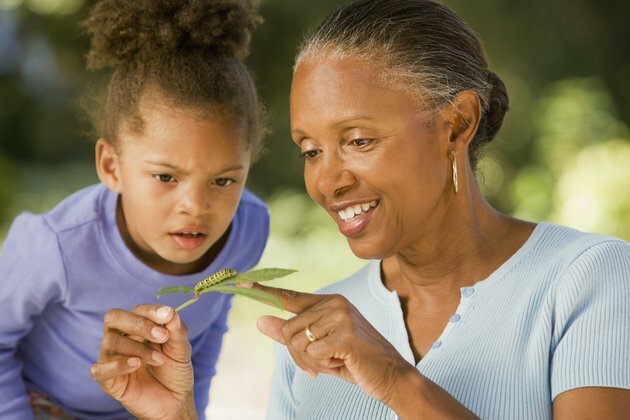Want to teach kids about nature? Insects can help
The Conversation
29 Oct 2020, 18:11 GMT+10

Insects are everywhere - in backyards, balconies and the park down the street.
In fact, numerically speaking, insects dominate the Earth with more than 5.5 million species. An estimated 10 quintillion - or 10,000,000,000,000,000,000 - individual insects are alive at any given moment.
Because insects are small and readily available and can easily be kept in the classroom or at home, as insect researchers we believe they are ideal for teaching children about nature - which can in turn get them excited about science. So we conducted a survey to learn more about how public schools use insects.
Teachers prefer vertebrates
We surveyed 262 K-12 teachers in 44 states regarding the kinds of animals they use in their classrooms. Of the teachers who responded to this 2019 survey, six taught preschool, 62 taught elementary school, 44 taught middle school and 147 taught high school. The rest taught at all levels of instruction.
We found that teachers were most likely to choose vertebrates for education in the classroom, with 328 instances of amphibians, birds, fish, mammals and reptiles. We also found 144 instances of invertebrates, including insects, worms, spiders and crustaceans - such as crabs and shrimp.
The most common insects were butterflies, followed by beetles and cockroaches.
About 2 in 3 of the surveyed teachers said they do not keep insects or spiders in their classrooms because they prefer other animals. Another 1 in 6 said it was because they do not like insects. The responses show how rare it is for teachers to use insects in their classrooms and the small number of insect species they select for this purpose.
Experiencing nature
Although many people are afraid of insects, they are a great teaching tool for many reasons. For example, insects are useful for an extraordinary range of lessons, from metamorphosis to diversity. They also tend to be inexpensive and easy to care for.
One reason we encourage teachers to use insects in their classrooms is that we've observed that interacting with insects can help children appreciate nature. Rearing butterflies and moths in classrooms, or simply observing these insects outside, gives students the opportunity for a hands-on learning experience. More often than not, observing these insects leads to further inquiry and curiosity about the natural environment in which they're found.
We believe that by keeping insects in the classroom, young children have a chance to learn more about these animals. Insects are often feared or dismissed because of stigma in popular culture and general disgust. As entomologists, we believe that introducing insects in the classroom, paired with teaching students about insect behavior and environmental roles, will give students a safe place to observe and appreciate these organisms.
Studies in the U.S., Norway, China and Japan have all found that children who have many experiences in nature at a young age develop positive attitudes toward animals and the environment. For example, a survey of 1,030 urban Japanese residents found that collecting insects and plants outdoors was one of the most important factors for positive attitudes toward wild animals.
[Deep knowledge, daily. Sign up for The Conversation's newsletter.]
During the COVID-19 pandemic, many teachers may not be able to use insects directly in their classrooms, with instruction being remote for at least part of the school year. But educators can aim a computer camera at live large insects and use teleconferencing software to teach kids. We have, for example, successfully used Zoom to show a group of kids across Florida live large Eastern Hercules beetles, praying mantises and giant katydids.
What's more, there are opportunities to use insects for learning outdoors, even if in colder climates there might not be year-round opportunities as we have in Florida.
Authors: Akito Y. Kawahara - Associate Professor and Curator of Insects, Florida Museum of Natural History, University of Florida | Megan Ennes - Assistant Curator of Museum Education, University of Florida | Amanda Markee - Researcher at the Florida Museum of Natural History, University of Florida 
 Share
Share
 Tweet
Tweet
 Share
Share
 Flip
Flip
 Email
Email
Watch latest videos
Subscribe and Follow
Get a daily dose of Florida Statesman news through our daily email, its complimentary and keeps you fully up to date with world and business news as well.
News RELEASES
Publish news of your business, community or sports group, personnel appointments, major event and more by submitting a news release to Florida Statesman.
More InformationInternational
SectionNTSB urges FAA to restrict helicopters near Reagan National Airport
WASHINGTON, D.C.: U.S. Transportation Secretary Sean Duffy announced that helicopters will be permanently banned from flying near Washington...
Virginia governor warns US must fast-track fusion or fall behind China
NEW YORK CITY, New York: The U.S. must accelerate its efforts to develop fusion energy or risk losing its edge to China, Virginia Governor...
China now dominates shipbuilding; US faces security risks
WASHINGTON, D.C.: In the past 20 years, China has become the world's top shipbuilder, producing more than half of all commercial ships....
New York fires 2,000 prison guards after wildcat strike
ALBANY, New York: New York fired over 2,000 prison guards this week for not returning to work after a weeks-long strike that disrupted...
China hits Canadian agriculture with tariffs in trade retaliation
BEIJING, China: China has announced new tariffs on Canadian agricultural and food products in retaliation for Canada's recent duties...
One dead, three injured as RV flips in Texas storm
ENNIS, Texas: A man died, and three of his family members were injured when their RV flipped several times during a strong storm at...
Business
SectionBoeing's February deliveries surge to 44, up from 27 last year
SEATTLE, Washington: Boeing saw a significant increase in aircraft deliveries in February, reporting 44 planes delivered compared to...
Southwest ends free checked bags, introduces new fees
DALLAS, Texas: Southwest Airlines will start charging passengers for checked bags, ending a long-standing policy that set it apart...
U.S. stocks rally hard despite drop in consumer sentiment
NEW YORK, New York - U.S. stocks rallied hard on Friday, boosted by strong rises around the world. Investors shrugged off a decline...
Maserati cancels electric MC20 plans over low demand
MILAN, Italy: Maserati has scrapped plans for an electric version of its MC20 sports car, citing low expected demand for the high-performance...
Volkswagen to slash 1,600 jobs at Cariad by year-end
BERLIN, Germany: Volkswagen is set to cut 1,600 jobs at its Cariad software division by the end of the year, affecting nearly 30 percent...
Travel to and from Israel to be boosted by terminal reopening
The principal terminal, Terminal 1, at Israel's largest airport will reopen at the end of this month, having largely been closed since...













